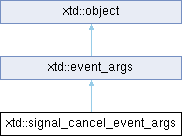xtd::signal_cancel_event_args Class Referencefinal
Inheritance diagram for xtd::signal_cancel_event_args:

Definition
Provides data for the environment signal event. This class cannot be inherited.
- Namespace
- xtd
- Library
- xtd.core
- Remarks
- A user can interrupt a console application process by simultaneously pressing the Control modifier key and the C console key (Ctrl+C), or the Control modifier key and the Break console key (Ctrl+Break). The console consequently provides a signal_cancel_event_args object to the event handler for the console::cancel_key_press event to specify whether the process should be cancelled.
-
If the cancel property is set to
truein the event handler, the process is resumed; otherwise, the process is terminated. By default, the value of the signal_cancel_event_args property isfalse, and the process terminates.
Public Constructors | |
| signal_cancel_event_args ()=default | |
| Initializes a new instance of the signal_cancel_event_args class. | |
| signal_cancel_event_args (xtd::signal signal) | |
| Initializes a new instance of the signal_cancel_event_args class. | |
Public Properties | |
| bool | cancel () const noexcept |
Gets a value that indicates whether a signal has interrupted the current process. The default is false, which terminates the current process. | |
| void | cancel (bool cancel) |
Sets a value that indicates whether a signal has interrupted the current process. The default is false, which terminates the current process. | |
| xtd::signal | signal () const noexcept |
| Gets the signal that interrupted the current process. | |
Additional Inherited Members | |
| static const event_args | empty |
| Provides a value to use with events that do not have event data. | |
| event_args ()=default | |
| Initializes a new instance of the event_args class. | |
| object ()=default | |
| Create a new instance of the ultimate base class object. | |
| virtual bool | equals (const object &obj) const noexcept |
| Determines whether the specified object is equal to the current object. | |
| virtual xtd::size | get_hash_code () const noexcept |
| Serves as a hash function for a particular type. | |
| virtual type_object | get_type () const noexcept |
| Gets the type of the current instance. | |
| template<class object_t> | |
| xtd::unique_ptr_object< object_t > | memberwise_clone () const |
| Creates a shallow copy of the current object. | |
| virtual xtd::string | to_string () const |
| Returns a xtd::string that represents the current object. | |
| template<class object_a_t, class object_b_t> | |
| static bool | equals (const object_a_t &object_a, const object_b_t &object_b) noexcept |
| Determines whether the specified object instances are considered equal. | |
| template<class object_a_t, class object_b_t> | |
| static bool | reference_equals (const object_a_t &object_a, const object_b_t &object_b) noexcept |
| Determines whether the specified object instances are the same instance. | |
Constructor & Destructor Documentation
◆ signal_cancel_event_args() [1/2]
|
default |
Initializes a new instance of the signal_cancel_event_args class.
◆ signal_cancel_event_args() [2/2]
|
explicit |
Initializes a new instance of the signal_cancel_event_args class.
- Parameters
-
signal One of the enumeration values that specifies the key combination that interrupted the current process. There is no default value..
Member Function Documentation
◆ cancel() [1/2]
|
noexcept |
Gets a value that indicates whether a signal has interrupted the current process. The default is false, which terminates the current process.
- Returns
trueif the current process should resume when the event handler concludes;falseif the current process should terminate. The default value is false; the current process terminates when the event handler returns. Iftrue, the current process continues.
◆ cancel() [2/2]
| void xtd::signal_cancel_event_args::cancel | ( | bool | cancel | ) |
Sets a value that indicates whether a signal has interrupted the current process. The default is false, which terminates the current process.
- Parameters
-
cancel trueif the current process should resume when the event handler concludes;falseif the current process should terminate. The default value is false; the current process terminates when the event handler returns. Iftrue, the current process continues.
◆ signal()
|
noexcept |
Gets the signal that interrupted the current process.
- Returns
- One of the enumeration values that specifies the signal that interrupted the current process. There is no default value.
The documentation for this class was generated from the following file:
- xtd.core/include/xtd/signal_cancel_event_args.hpp
Generated on Sat Feb 14 2026 17:17:22 for xtd by Gammasoft. All rights reserved.
